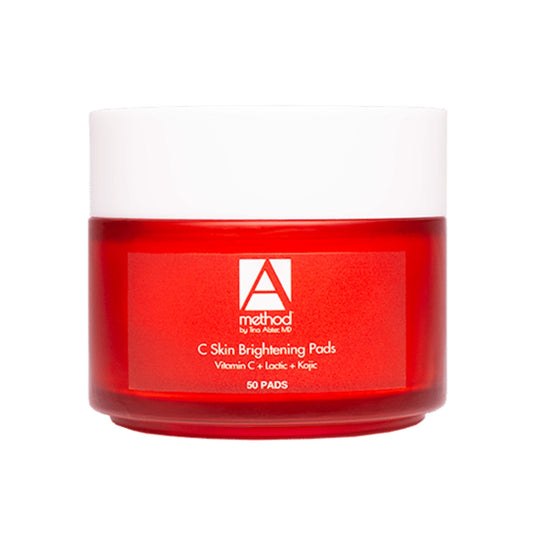

Browse Skincare Products by The A Method
All the essentials for every skincare routine.
Vitamin C Skincare
Looking to achieve radiant, youthful skin? The A Method utilizes THDA (Tetrahexyldecyl Ascorbate) – a skin-soluble form of Vitamin C – that penetrates deeply and works with your skin to brighten and balance tone while protecting against free radicals.
What is vitamin C?
Also known as Ascorbic acid, vitamin C is a potent antioxidant that's crucial to skin health and comes in many forms utilized in skincare products..
Benefits of topical Vitamin C in Skincare
- Collagen production: Helps nurture conditions for strong collagen.
- Antioxidant properties: Helps naturally neutralize free radicals, unstable molecules that can potentially damage cells.
- Skin brightening: Helps reduce the appearance of dark spots and hyperpigmentation for brighter, more even skin tone with daily use.
- Anti-aging: Promotes collagen production, helping to reduce conditions for fine lines and wrinkles.
- Protection from sun damage: Helps protect the skin from damage caused by harmful ultraviolet (UV) rays. (Note: Vitamin C is not a replacement for sunscreen.)
- Reduces redness: Helps soothe irritated skin and reduce redness.
Form of vitamin C in skincare
- L-ascorbic acid: Most potent form of vitamin C, highly effective but can be unstable when exposed to air and formulated with water.
- Tetrahexyldecyl ascorbate: A lipid soluble form of vitamin C that absorbs deeper into the skin due to its oil-soluble characteristics.
When should I use vitamin C serum in my skincare routine?
Vitamin C serum is best applied in the morning, right after cleansing and toning but before moisturizing and putting on sunscreen. This way, it can protect your skin from UV exposure and environmental pollutants throughout the day. Make sure to pair it with a good SPF for optimal results.
Can I mix vitamin C with other skincare ingredients?
Yes, you can combine vitamin C with other ingredients, but it's important to know which ones work well together and which don't.
Ingredients you can mix with vitamin C
- Hyaluronic acid: Hyaluronic acid locks in moisture, while vitamin C brightens and helps with fine lines and wrinkles.
- Vitamin E: Vitamin E boosts vitamin C's antioxidant properties. You'll often find these two together in serums.
- Ferulic acid: This helps stabilize vitamin C and increase its effectiveness.
- SPF: Although not technically an ingredient, applying sunscreen after vitamin C complements its UV protection capabilities.
Ingredients to avoid mixing with vitamin C
- Retinol: Retinol and vitamin C are both strong ingredients. Using them together can cause irritation, especially for sensitive skin.
- Niacinamide: Although newer formulations combine niacinamide with vitamin C, in high concentrations, they can cancel each other out. It's best to use them at different times, e.g., vitamin C in the morning, niacinamide at night.
- Benzoyl peroxide: This ingredient can oxidize vitamin C (causing it to react with oxygen and break it down), making it less effective.
Remember, when mixing vitamin C with other ingredients, consider the concentrations of each product and the specific needs of your skin. If you have sensitive skin or are unsure about the best combinations, consult with a dermatologist for personalized advice.
How do I incorporate vitamin C into my skincare routine?
Here's how to add vitamin C to your skincare routine:
- Cleanser: Use a gentle cleanser to wash your face and remove impurities like dirt and oil.
- Toner (optional): If you use a toner, apply it after cleansing to pick up any leftover dirt or makeup and prep your skin for the rest of your routine.
- Vitamin C serum: Apply a few drops of vitamin C serum to clean, dry skin.
- Moisturizer: After the serum absorbs, follow up with a moisturizer. A formula with hyaluronic acid works great with vitamin C.
- Sunscreen (morning): Always finish your morning routine with sunscreen to protect your skin throughout the day.
- Retinol (night): If you use retinol, save it for your nighttime routine – vitamin C is best for daytime protection.
Some additional tips:
- Patch test: Before applying new products, do a patch test on a small area of the skin to check for any reactions.
- Be consistent: For best results, use vitamin C consistently as part of your daily skincare routine.
- Consult a dermatologist: For any specific concerns or if you're unsure about incorporating vitamin C into your routine, visit a dermatologist for personalized recommendations.
What are the best vitamin C serums?
The best vitamin C serums offer powerful antioxidant protection and skin-brightening benefits:
High concentration serums
Serums with higher concentrations of vitamin C, around 15-20%, are ideal for people looking to target visible signs of aging, such as fine lines, wrinkles, and dark spots. These products often come in lightweight gel or serum forms for maximum absorption.
Vitamin C with antioxidant boosters
Some serums mix vitamin C with other antioxidants like ferulic acid or vitamin E to stabilize vitamin C, making it even more effective at protecting your skin against UV and environmental damage.
Serums for sensitive skin
If you have sensitive skin, there are gentler options that pair vitamin C with hydrating ingredients like hyaluronic acid. These serums deliver antioxidant benefits without the irritation, making them suitable for daily use.
Brightening serums with silky formulas
For a lightweight, silky texture that absorbs quickly and leaves your skin looking bright and refreshed, go for serums that work well under makeup and feel light on your skin.
Gel-based antioxidant serums
Want a refreshing but non-sticky feel? Vitamin C gels are perfect for normal to oily skin, offering a smooth, matte finish while delivering the brightening and anti-aging benefits of vitamin C.
Is vitamin C good for a moisturizer?
Yes, vitamin C can be excellent in a moisturizer! It brightens your skin, helps smooth out fine lines and wrinkles and protects against environmental damage.
Plus, vitamin C moisturizers can even out your skin tone while keeping it hydrated. When combined with ingredients like hyaluronic acid, it boosts moisture retention and leaves your skin looking plump and refreshed—perfect for daily use.
What is a vitamin C cream?
A vitamin C cream is a type of moisturizer that not only hydrates your skin but also offers antioxidant protection—ideal for brightening your complexion, reducing dark spots, and improving skin texture. You can use it in the morning to protect your skin from UV damage (in combination with sunscreen) and at night for overnight skin repair.
Is vitamin C for skin recommended by dermatologists?
Yes, dermatologists definitely recommend vitamin C for skin care. It's a powerful antioxidant with multiple benefits, like brightening the skin, anti-aging, and protecting against UV damage. It also works well for various skin types, such as oily skin, sensitive skin, and even acne-prone skin.
Which moisturizer is best to use with vitamin C?
The best moisturizer to use with vitamin C depends on your skin type and specific needs. Here are a few options:
- Moisturizers with hyaluronic acid: Vitamin C can be drying sometimes, so pairing it with a moisturizer with hyaluronic acid prevents skin from drying out. Best for all skin types but especially for sensitive skin.
- Moisturizers with SPF: Combining vitamin C with an SPF moisturizer enhances protection against sun damage.
- Moisturizers for oily or acne-prone skin: Lightweight, oil-free moisturizers hydrate without clogging the pores. When combined with vitamin C, they help brighten the skin minus the excess oil. Gel-based moisturizers are best for oily or acne-prone skin.
- Moisturizers with peptides or niacinamide: For anti-aging, these moisturizers are great options to pair with vitamin C. Peptides boost collagen production, and niacinamide soothes and evens out skin tone—perfect complements to vitamin C's brightening effects.
If you're looking for a specific product, check out The A Method's vitamin C-based Orange You Peppy facial moisturizer and C Glow antioxidant moisturizer—they hydrate, brighten, and help protect your skin from damage.
Is a vitamin C moisturizer good for mature skin?
Yes, vitamin C moisturizers are excellent for aging skin. They help boost collagen production, reduce the appearance of fine lines, and improve skin elasticity.
What is the best vitamin C serum for the face?
Dermatologists often recommend serums with 10-20% vitamin C concentration, combined with ferulic acid and vitamin E for enhanced effectiveness and stability.
What is the best vitamin C serum recommended by dermatologists?
Dermatologists often recommend serums like The A Method C Antioxidant Gel 20%, which has a high concentration of vitamin C for brightening and tackling visible signs of aging. This medical-grade skincare gel formulation delivers antioxidant protection, helps fade dark spots, smooths fine lines, and improves your skin's overall texture.
Should I use a vitamin C face mask?
Using a vitamin C face mask can give your skin a powerful antioxidant boost, brighten, and hydrate it. Apply once or twice a week for noticeable results.
-
C Antioxidant Gel 20%
Vitamin C Serum
Regular price $150.00 USDRegular priceUnit price / per5.0 / 5.0
(17) 17 total reviews
-
Orange You Peppy
35% Active Facial Moisturizer
Regular price $84.00 USDRegular priceUnit price / per5.0 / 5.0
(4) 4 total reviews
-
C Skin Brightening Pads
Skin Brightening Pads
Regular price $42.00 USDRegular priceUnit price / per5.0 / 5.0
(1) 1 total reviews
-
C Glow Moisturizer
Antioxidant Moisturizer
Regular price $75.00 USDRegular priceUnit price / per




